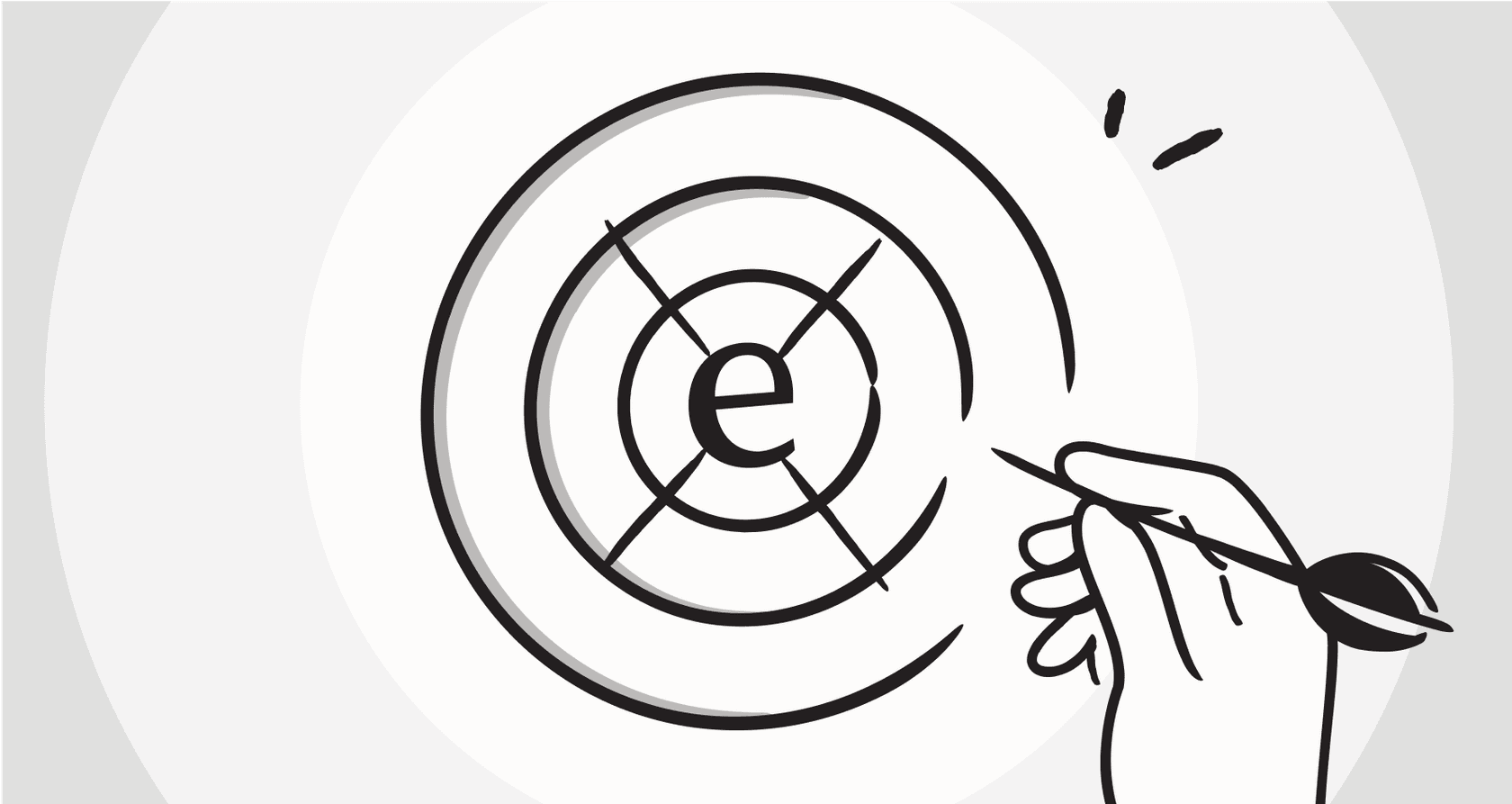
Let’s be honest, most sales reps get into the game for the thrill of the chase and the satisfaction of closing a deal, not for the mountain of paperwork that comes with it. But the reality is that a huge chunk of their time gets eaten up by admin work. In fact, recent data shows that sales reps spend only about 28% of their time actually selling. The rest is lost to data entry, research, and manual follow-ups.
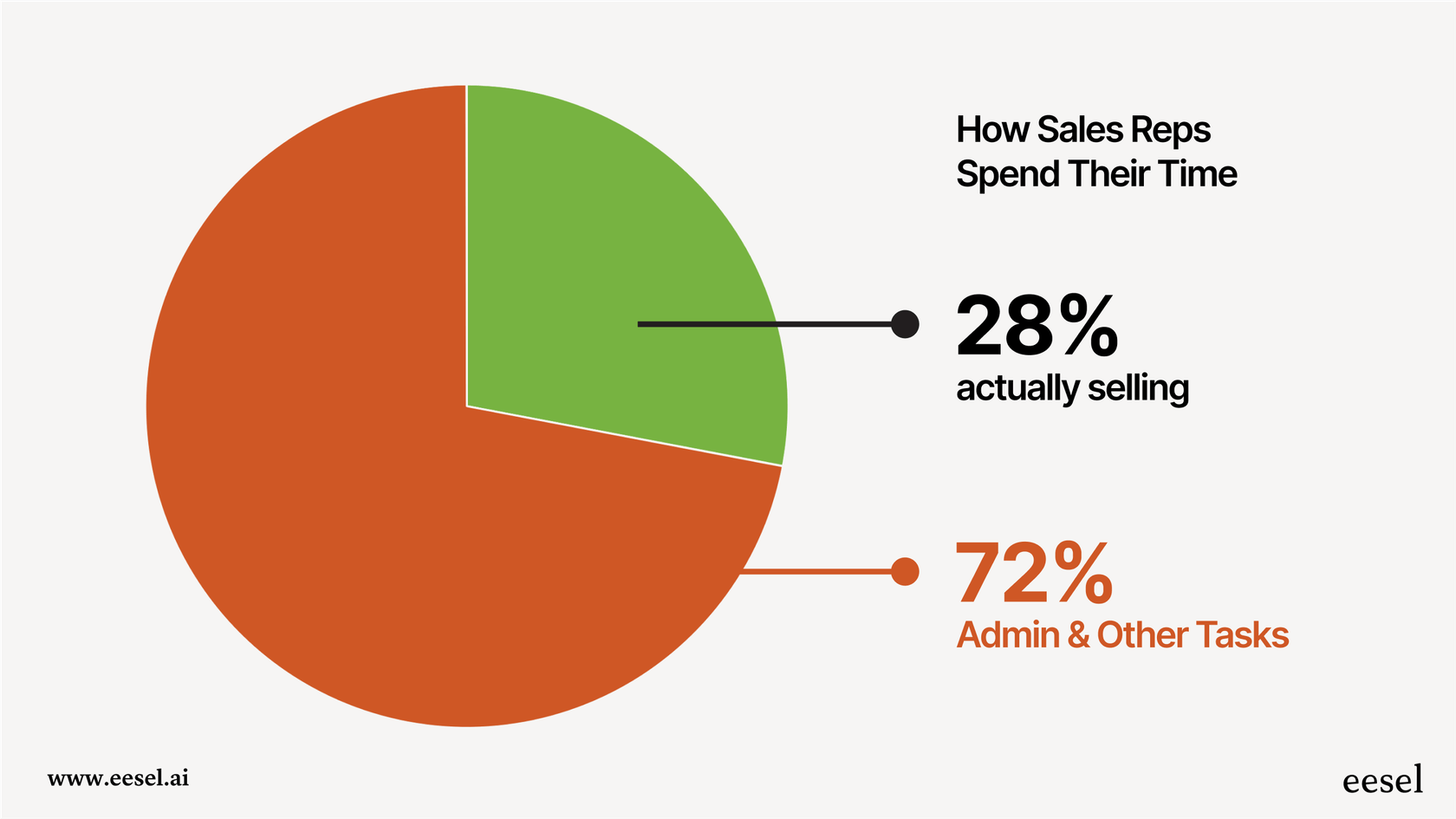
This is the exact problem an AI sales agent is designed to solve. It automates the repetitive, time-sucking parts of the job, which frees up your team to focus on what they do best: talking to people and hitting their numbers. This guide will give you a clear, no-fluff look at what an AI sales agent is, what it can do, the hidden headaches of getting one set up, and how to tell if it's actually helping your bottom line.
What is an AI sales agent?
An AI sales agent is a smart piece of software that handles sales tasks on its own, without needing a human to guide its every move. Think of it as a digital teammate that takes on the grunt work so your human reps can focus on more strategic things.
It's important to know that this isn't just another chatbot or a simple automation rule. Basic automation just follows a rigid script you give it ("if this happens, do that"). A real AI sales agent, on the other hand, can look at data, learn from conversations, and make its own decisions. It's the difference between a tool that follows orders and one that can actually think for itself.
Generally, AI sales agents come in two flavors:
- Autonomous agents: These agents are the silent workers behind the scenes. They can run a process from start to finish, like digging up info on new leads, qualifying them, sending the first outreach email, and even getting that first meeting on the calendar for a human rep.
- Assistive agents (or Copilots): These are more like a partner for your human reps. They can join a sales call to offer real-time tips, draft a personalized follow-up email in a few seconds, or find the perfect case study to handle an objection right when it comes up.
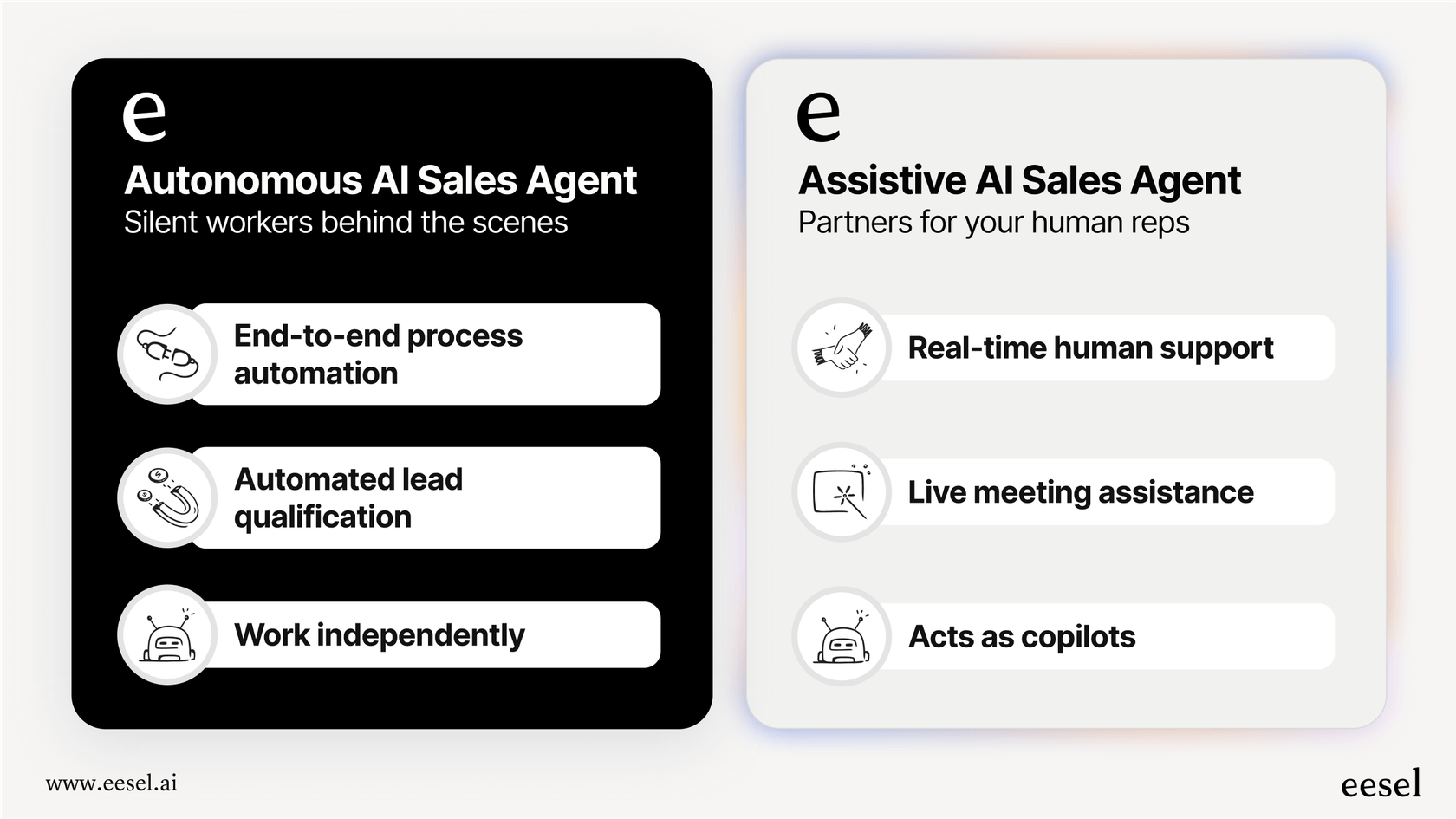
Core AI sales agent capabilities and common use cases
An AI sales agent can help out at every stage of the sales cycle, from drumming up new business to keeping your internal ops running smoothly.
Automating top-of-funnel prospecting
This is usually the first place where AI sales agents make a big difference. They can take over the most draining parts of finding and talking to new prospects.
- Lead research and enrichment: An agent can scan websites, LinkedIn profiles, and other data sources to pull key info on a lead. It can turn a simple email address into a full profile with a job title, company details, and recent news, giving your reps the context they need for a real conversation.
- Personalized outreach at scale: Forget about generic email blasts that everyone ignores. An AI agent can write and send thousands of personalized emails that mention a prospect's specific industry, a recent job change, or a company announcement. This makes it way more likely you'll get a reply.
- 24/7 lead qualification: Your website is constantly bringing in potential leads, but you can't have someone there to greet them at 2 a.m. An AI agent can chat with visitors the moment they land on your site, asking the right questions to see if they're a good fit before sending them to a sales rep.
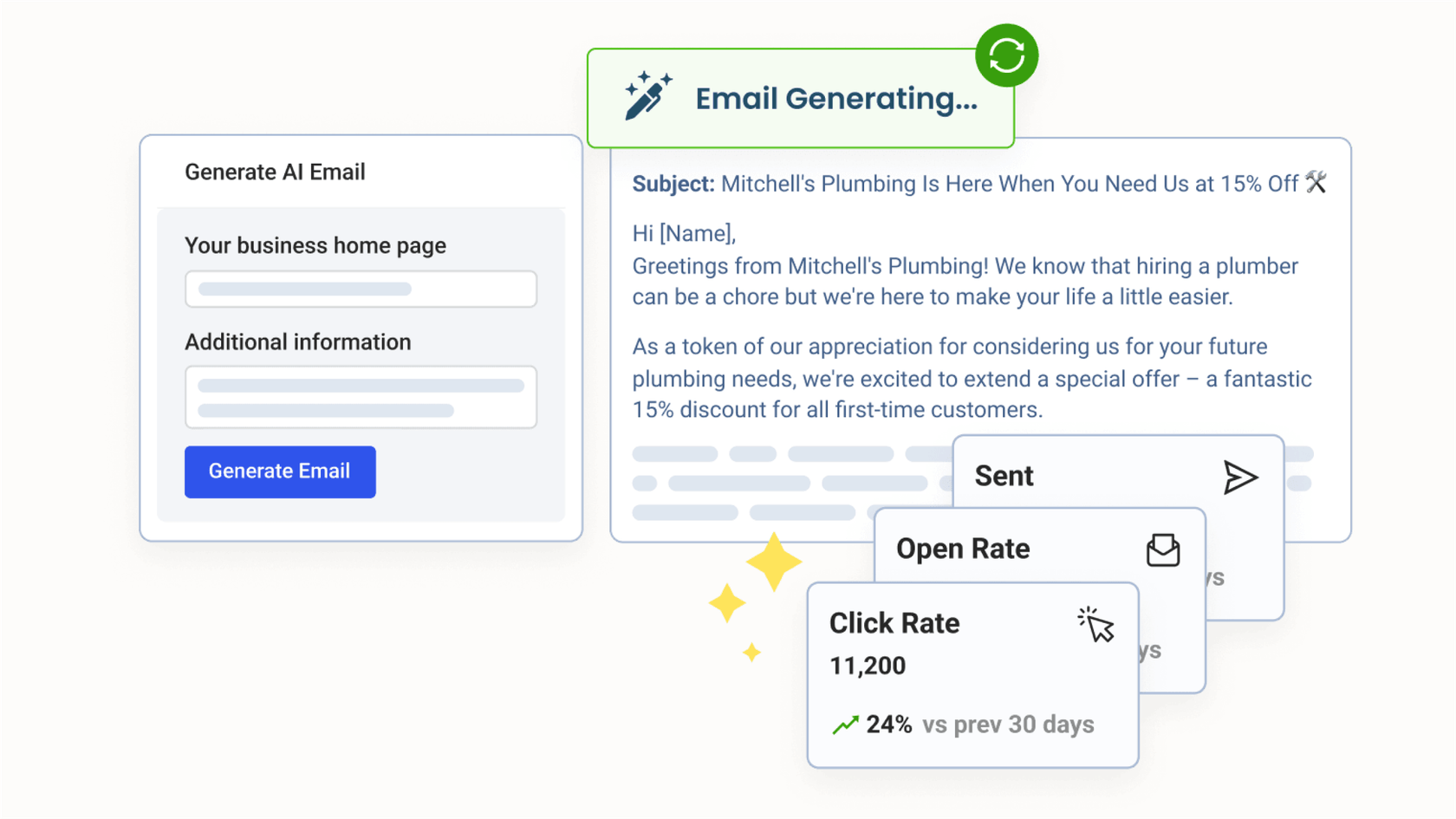
The catch, of course, is that this automation is only as good as the data it learns from. Most agents are stuck with just the info in your CRM, which is only a small piece of your company's knowledge. A more connected platform like eesel AI can pull information from all your sources, like old support tickets, Confluence pages, Google Docs, and internal wikis. This helps it have much smarter, more relevant conversations from day one.
Streamlining mid-funnel deal progression
Once a lead is in the pipeline, an AI sales agent can help you keep things moving forward without letting deals go cold.
- Automated scheduling and follow-ups: All the back-and-forth emails to find a meeting time can completely kill a deal's momentum. An AI agent can handle this, finding a time that works for everyone and sending reminders so people actually show up.
- Instant answers to product questions: When prospects have questions, they want answers right away. An AI agent trained on your help center articles and product docs can give them accurate info on the spot, keeping them interested and engaged.
- Live meeting assistance: An assistive agent can be a secret weapon on calls. It can join a meeting, transcribe everything in real-time, and automatically pull up useful documents, like a competitor comparison chart or pricing info, exactly when your rep needs it.
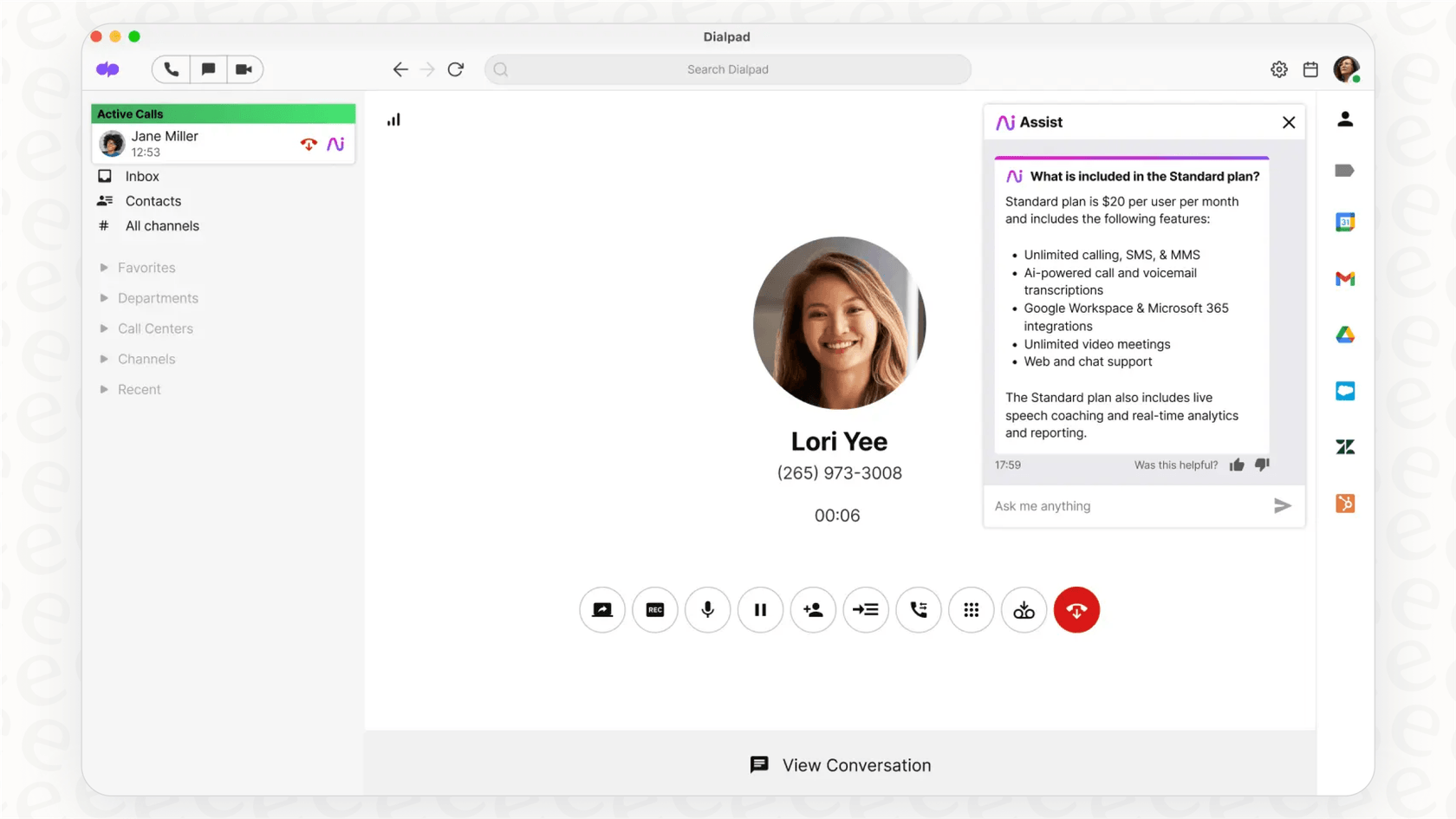
Supporting internal sales operations
The benefits aren't all customer-facing. An AI sales agent can also make life a lot easier for your own team.
- CRM data hygiene: This is the one admin task every sales rep hates. An AI agent can automatically log call notes, update deal stages in your CRM, and make sure all your records are clean and current. This alone can save each rep hours every single week.
- Sales training and roleplaying: Getting new reps up to speed takes a lot of time and energy. An AI agent can act as a practice partner, running new hires through mock sales calls, letting them practice their pitch, and giving instant, consistent feedback.
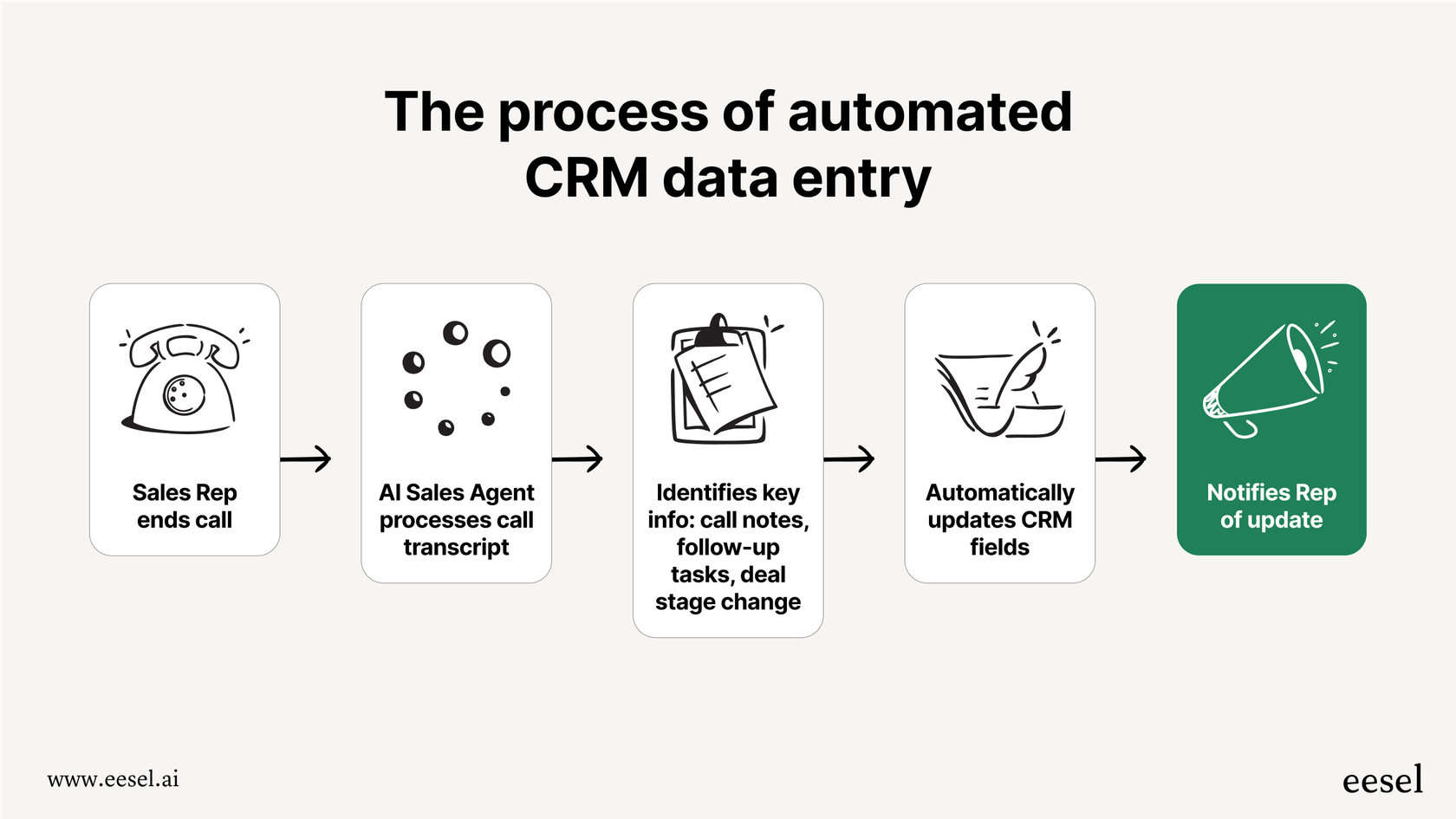
How to implement an AI sales agent (and the hidden complexities)
The promise of an AI sales agent sounds great, but actually getting one up and running can be a whole different story. The process is often full of messy little problems that vendors conveniently forget to mention on their websites.
The challenge of integration and setup
First, you have to connect the AI agent to all your tools, your CRM, knowledge bases, and chat platforms, so it has the information it needs to do its job. Unfortunately, this is where most people hit their first big wall.
Many vendors require complicated, developer-heavy setups that can take months to complete. You might need to mess with APIs, configure custom webhooks, or even switch away from the tools you're already using. It's a slow, expensive, and frustrating process that can put the entire project at risk before you've even started.
This is why it's so important to find a platform that's built for simplicity. For example, eesel AI is designed to be completely self-serve, so you can go live in minutes, not months. With one-click integrations for helpdesks like Zendesk and Freshdesk, you can get everything connected on your own without writing a single line of code.
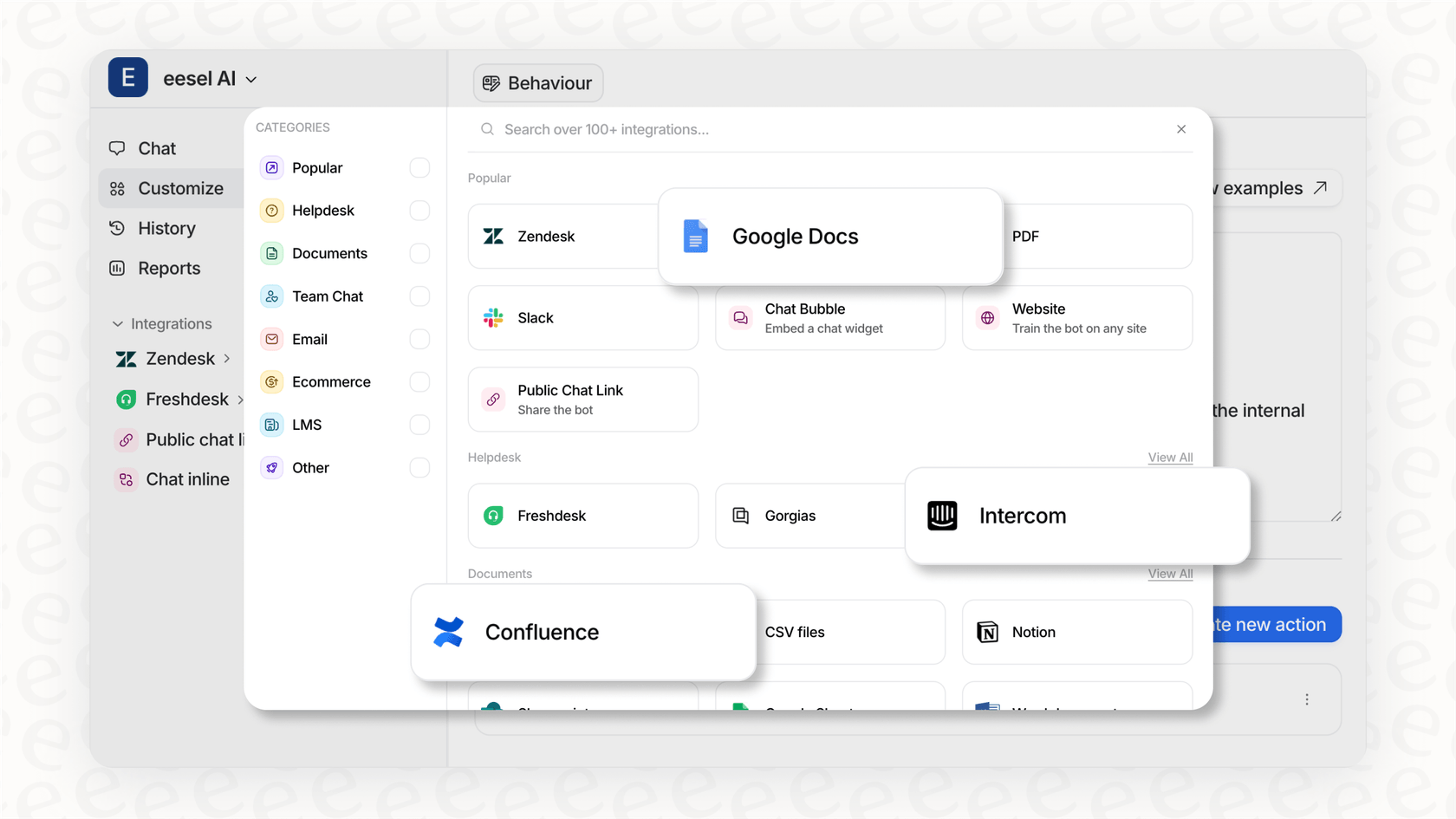
The risk of losing control
Once the tool is connected, you have to teach the AI what to do by setting up rules and workflows. This is another area where many platforms just don't measure up.
A common issue is that many AI sales agents are a "black box." They lock you into rigid, all-or-nothing automation. You either let the AI handle everything, or you do it all yourself. There's not much room to tweak things, which can lead to the AI saying things that are off-brand, creating bad customer experiences, and causing your reps to lose trust in the tool.
You're much better off with a tool that gives you fine-grained control. eesel AI has a fully customizable workflow builder that lets you decide exactly what the AI does. You can choose which types of leads or questions it handles. You can set its personality, its tone of voice, and the specific actions it's allowed to take. This way, the AI always feels like a natural extension of your team.
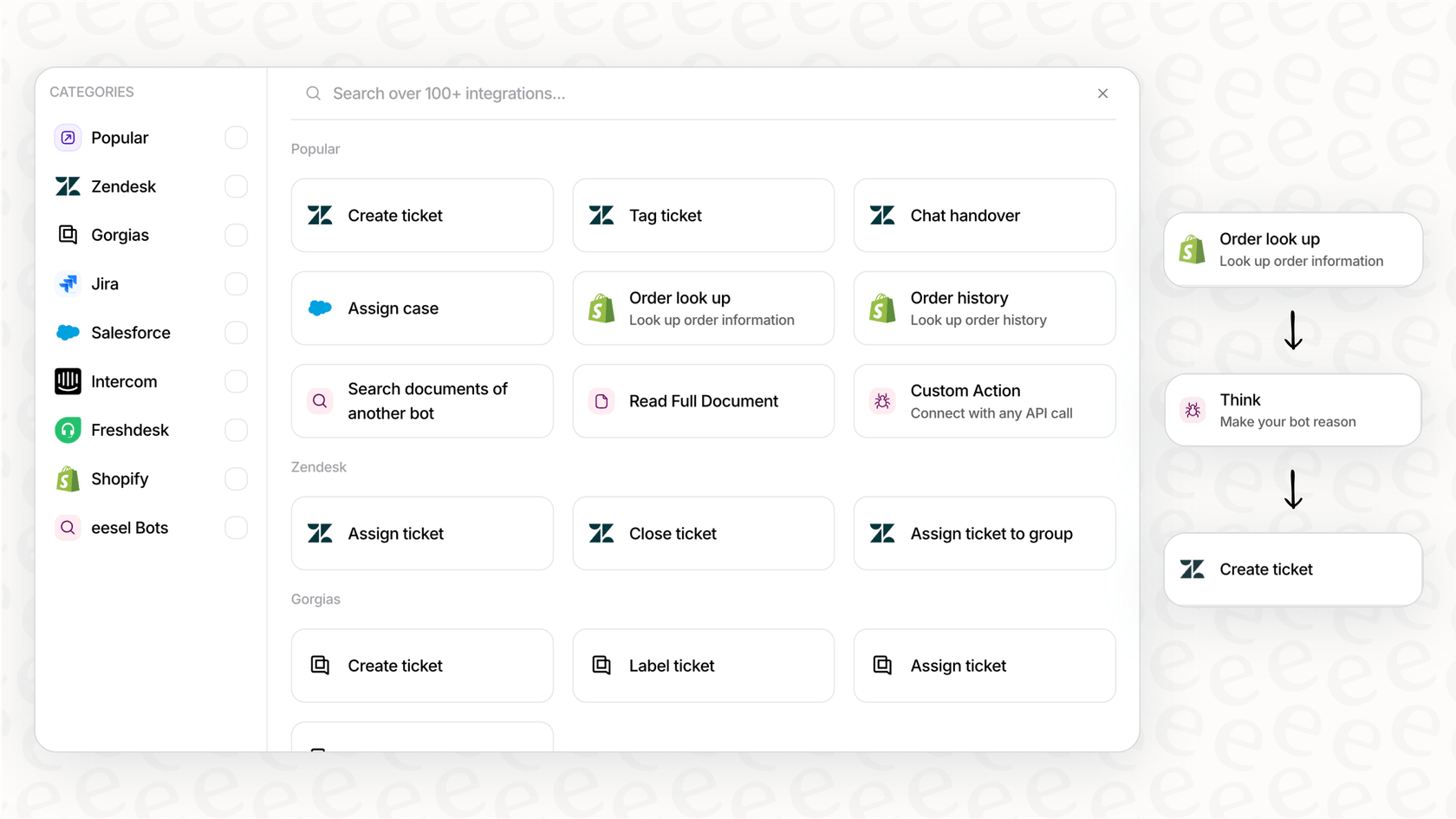
The fear of deploying without confidence
Finally, before you let an AI start talking to your prospects, you need to be 100% sure it's going to do a good job.
The problem is, most platforms don't give you a good way to test things out. They expect you to sit through a quick demo, sign a contract, and then just flip the switch and hope for the best. That’s a huge gamble that could easily damage your reputation and cost you business.
You should never have to launch an AI blind. eesel AI has a simulation mode that lets you test your entire setup on thousands of your past conversations in a safe environment. You can see exactly how the AI would have answered real questions from the past, get an accurate prediction of its performance, and tweak its behavior until you're completely confident, all before it ever interacts with a live human.
How to measure the ROI of your AI sales agent
Once your agent is up and running, you need to track how it's doing. Success isn't just about the tech working; it's about whether it's actually making a difference for your business.
Key AI sales agent performance metrics to track
You'll want to measure both how much time it's saving and how much it's improving performance.
- Productivity Gains: The easiest thing to measure is how much time your reps are saving on admin tasks. If the AI is handling CRM updates and initial lead research, how many hours does that give back to your team for actual selling?
- Performance Uplift: Keep an eye on your main sales numbers. Are you booking more meetings? Are you generating more marketing qualified leads (MQLs) or sales qualified leads (SQLs)? Is your average response time getting faster?
- Pipeline Health: A good AI agent should also improve your overall pipeline. Are you seeing more deals in the works? Are your sales cycles getting shorter because things are moving along more smoothly?
The right tool will give you more than just a simple dashboard. The analytics in eesel AI don't just show you what the AI did; they also spot gaps in your knowledge base and point out trends in what prospects are asking. This gives you a clear roadmap for how to keep making your sales process better.
The hidden costs to avoid
When you're looking at the money side of things, watch out for sneaky pricing models that can blow up your budget.
A common trap is vendors that charge you per resolution or per meeting booked. This sounds fine at first, but it means your bill goes up the more successful you are. You're basically punished for scaling. These vendors also tend to lock you into long, inflexible annual contracts that you can't get out of if the tool isn't working for you.
Instead, look for a partner with clear, predictable pricing. eesel AI's pricing is straightforward and based on your needs, with no per-resolution fees. You can start on a flexible monthly plan and cancel anytime, which keeps your costs under control and tied to the value you're actually getting.
| Feature | Typical AI Agent Platforms | eesel AI |
|---|---|---|
| Pricing Model | Per-resolution or per-lead fees | Predictable monthly/annual subscription |
| Cost Control | Unpredictable; costs scale with volume | Capped and predictable |
| Contract Terms | Often require long-term annual contracts | Flexible monthly options available |
| Hidden Fees | Common for setup, support, or extra features | None. Transparent pricing. |
Choosing the right AI sales agent partner
An AI sales agent can be a huge asset, but whether it succeeds or fails really comes down to choosing the right platform. It's not just about the features on a checklist; it's about how easy it is to get started and use.
The biggest roadblocks are almost always a complicated setup, not having enough control over the AI's behavior, and the risk of launching an untested tool. The best AI sales agent is one that lets your team get started quickly, gives you full control over the process, and lets you go live feeling confident.
Ready to see what a smarter AI sales agent can do? Stop wasting time on repetitive tasks and let your sales team do what they do best: sell. With eesel AI, you can launch a powerful, fully customized AI agent in minutes.
Start your free trial or book a demo to see how eesel AI can transform your sales workflow today.
Frequently asked questions
Not exactly. While a simple chatbot follows a rigid script, a true AI sales agent can understand context, learn from your company's data, and make independent decisions to handle complex tasks like lead qualification, research, and scheduling.
That depends on the platform you choose. Many solutions are restrictive, but better tools provide full control over the AI's workflows, personality, and tone of voice, ensuring it always stays on-brand and acts as a true extension of your team.
Implementation time varies greatly. Some platforms require a complex, developer-led setup that can take months, while modern self-serve tools with one-click integrations can be up and running in just a few minutes.
No, the goal is to augment your team, not replace them. An AI sales agent handles the repetitive, low-value administrative work, which frees up your reps to focus on what they do best: building relationships and closing deals.
Focus on both productivity gains and performance uplift. Key metrics include hours saved on admin tasks, an increase in meetings booked or qualified leads generated, and a shorter overall sales cycle length.
Share this post

Article by
Stevia Putri
Stevia Putri is a marketing generalist at eesel AI, where she helps turn powerful AI tools into stories that resonate. She’s driven by curiosity, clarity, and the human side of technology.


